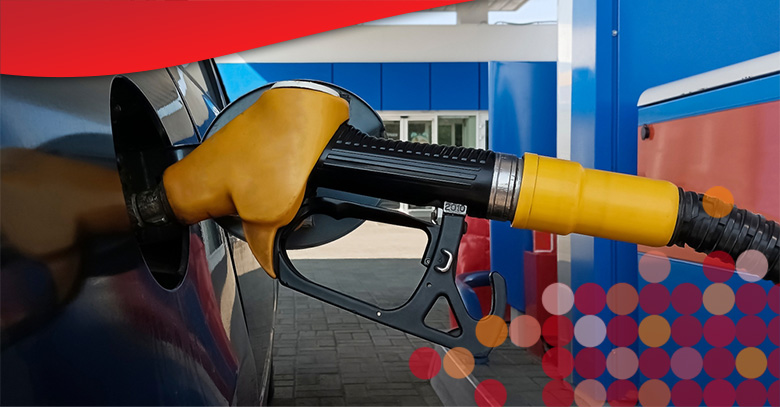One of the many recurring concerns for fleet managers, particularly in the current market where fuel costs are high, is monitoring fleet fuel consumption. Several variables, including the kind and condition of fleet vehicles, the number of miles driven, and the state of the roads driven, can influence fleet fuel consumption.
This blog post will discuss how Tourmo’s automated Fuel & CO2 solution can reduce fuel consumption and help your drivers learn to use less fuel.
What is Fleet Fuel Consumption?
Fuel consumption is the measure of gallons used vs distance traveled and it requires accurate recording of vehicle and fuel data. During analysis, fleet managers are to be aware of different fuel consumption due to minor manufacturing variations in similar vehicles. Further, the performance levels of vehicles are influenced by other factors, such as vehicle condition, weather, driver behavior, and the state of the roads traveled.
How Is Fuel Consumption Measured?
Fleet fuel consumption can be measured and tracked with manual recording processes. However, fuel consumption is more commonly tracked with technology, such as GPS, telematics systems, fuel flowmeters, and, in some cases, fuel level sensors.
If you're interested in calculating fuel consumption manually, you must accurately record the amount of fuel used and the distance your fleet vehicle traveled. Then, for each vehicle asset, this procedure would be repeated.
We've listed the fuel consumption formula in standard and metric measurements below for consideration:
Standard formula for fuel economy:
Fuel economy (mpg) = miles driven (mi) ÷ gallons used to refuel tank
Metric formula for fuel economy:
Liters/100 km = (liters used to refuel x 100) ÷ kilometers (km) driven
Additional Factors Influencing Fuel Consumption
As previously stated, several variables may affect fuel consumption. For example, fuel efficiency increases when the fleet is properly maintained and drivers do not drive aggressively. Further, fuel usage may vary depending on how, where, and when you drive.
The following variables impact your fleet's vehicles' fuel consumption:
- Speeding, rapid acceleration, and braking
- The vehicle's age and condition
- City and highway driving
- Weather and temperature
- Road and traffic conditions
How to Monitor Fleet Fuel Consumption
For fleet enterprise organizations worldwide, keeping a close eye on fuel usage and fuel loss is of the utmost importance. Risky driving behavior, poor vehicle condition, and even fuel theft contribute to higher fuel usage and therefore spend.
In most cases, adequate monitoring can prevent fuel loss and excessive expense. There are several ways to lower fuel-related expenses and fleet fuel consumption. The most common strategies involve implementing telematics systems, monitoring software, and fuel fleet card programs. These solutions are known to help monitor and manage fuel consumption.
The best solutions, however, should track for indications of fuel theft and risky driving behaviors, reduce labor-intensive manual monitoring and recording processes, and guide business decisions with powerful AI-powered insights.
Tourmo’s Fuel & CO2 solution with automated audit, review, and reporting capabilities can provide the highest level of visibility into your fleet operations and help you to improve fleet fuel economy. We will discuss these features in more detail below:
Fuel Theft Analysis
Unfortunately, excessive fuel consumption is frequently caused by fuel theft. Even the best fuel monitoring systems and exception management approaches fail to effectively prevent this issue, leading to extremely high financial losses.
Tourmo provides the most advanced fuel theft analysis currently available, which can reconcile fuel transactions automatically and uncover suspicious activities. With Tourmo AI, you’ll benefit from a fleet management solution that can closely monitor all aspects of fuel use within your company.
Tourmo’s Fuel & CO2 solution will allow you to track fuel purchased, fuel loaded into vehicles, use of fuel, and unaccounted-for fuel on an ongoing basis to highlight suspicious events. Our AI-powered platform provides access to valuable data and insights, can prevent frequent recordkeeping errors, and eliminate employee fuel theft and improper fuel card usage.
Contextualized Inefficient Driving Analysis
Addressing inefficient or reckless driving behavior is one of the most well-known ways to reduce higher levels of fleet fuel consumption. However, this requires utilizing advanced solutions capable of monitoring driving behavior without error.
Tourmo’s patented contextualized analytics and technology software can calibrate and normalize telematics data in context with driving environment factors such as weather, topography, population, and traffic density to build rich and meaningful driver behavior evaluations.
Tourmo AI combines contextualized analysis with a purposeful driver scoring system that provides positive reinforcement driver coaching in real-time, enabling you to increase fuel efficiency while minimizing the need for supervisor involvement.
Fuel & CO2 Workflow Management
A cutting-edge development in the fleet sector that will significantly boost fleet performance and fuel efficiency is the fusion of AI technology with automated workflows. These AI-powered automated workflows help fleet drivers learn to use less fuel while our gamification system motivates and rewards driver participation.
Our AI-powered Fuel & CO2 solution combines insights derived from your existing telematics data with automated workflows. This helps you automate the delivery of critical information across your organization to reveal your data's value and integrate it into your business to make immediate improvements to daily operations.
Tourmo’s Fuel & CO2 Solution
You can significantly improve your company's current fuel reduction strategy by using Tourmo’s CO2 and fuel solution. This technology can help fleet managers acquire insightful information about fuel use and uncover potential signs of fuel theft while identifying areas in their fleet operations that need improvement.
We’ve listed some of the main advantages of using Tourmo's AI-driven platform to enhance reporting and fuel efficiency below:
- Up to 20% improvement in fuel efficiency
- Substantial reduction in fuel costs
- Identify and eliminate potential fuel theft
- Reduce error-prone manual efforts to reconcile fuel transactions
- Up to 40% reduction in effort on environmental reporting
Reduce Fleet Fuel Consumption With Tourmo AI
Upwards of 60% or more of known fleet operating costs are attributed to fuel-related expenses. As a result, how well fuel monitoring and management are managed inside an enterprise organization will substantially impact future business outcomes.
Learning how to monitor fleet fuel consumption and utilizing a cutting-edge fuel management system that improves fleet performance levels and can keep up with your fleet's fuel economy will help you stay ahead of volatile gas prices.
Tourmo’s AI-powered platform can process mobility data from any smartphone, tablet, or telematics device and quickly provide company stakeholders, managers, and drivers with accurate data about inefficient driving, fuel spending, and new opportunities for fuel savings.
Author:
Matt Braun leads the Solutions Consulting team at Tourmo. He helps Tourmo customers better understand their challenges and uncover creative, efficient solutions to improve their operations. He guides them through the benefits provided by mobility workflow automation, AI-powered tools and reports, and the value of data science. Matt’s focus on clear, actionable, and effective information is foundational to all prescribed solutions. Matt came to Tourmo after 15 years as Sr. Director of Performance Improvement at First Student –– an organization operating a fleet of more than 40,000 vehicles. He holds a Bachelor of Business Administrations from the University of Cincinnati and a Masters of Business Administration from Thomas More College. Matt and his wife live in the Cincinnati area where Matt coaches most of the sports of their 2 sons and daughter.


 Matt Braun
Matt Braun


.jpg)
.jpg)